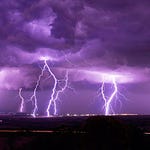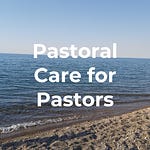I became impatient last year. My new church was progressing much more slowly than I wanted it to. As a “type A,” I planned for, and expected, results. Of course, the Covid-19 crisis in Ontario, which came with three lockdowns and multiple levels of restrictions, had complicated things. But we had been able to have a really good and successful summer and I expected to capitalize on that summer work and build into something greater.
Imagine my frustration as I saw summer slipping into fall and then into early winter with less and less to show.
I had time on my hands because there wasn’t really anything else to do as the calendar turned to December. It was too cold to meet outside, restaurants were closed to the public for dining in, and it was obvious we were heading towards another lockdown.
So I did what I should have done from the beginning--I turned to God. I doubled down on reflective Bible reading and listening prayer. And those exercises reminded me to trust God. Rather, God showed me the value and simplicity of listening to him and waiting upon him for direction and answers.
It reminded me of the experience of the Israelites as they wandered the wilderness. (The secular culture of Canada can feel like quite a wilderness!) They became hungry and thirsty and complained to God. They became impatient. But the lesson for me was this--God always provided for them.
Stop Grumbling and Complaining About What You Don’t Have
In Exodus 16, there is a story about hunger. The people were hungry. They complained to God. They didn’t trust that he would provide as they needed. But God did provide. Through Moses, he gathered the people and instructed them that he would provide for them--daily, even!
These daily provisions, however, came with a caveat--they were to gather enough manna for each day, and for each day only. If they gathered too much (i.e., to hoard, perhaps because they didn’t trust that God would provide daily), the manna spoiled overnight. And it didn’t matter how much they gathered, because each one ended up gathering all that they needed (16:18).
What a wonderful thing--God providing sustenance in the wilderness where it didn’t naturally occur.
One challenge many pastors face in ministry is the temptation to grumble about what they do not have. Grumbling occurs when we become too focused on scarcity--not enough funds, not enough people, not enough goodwill. In this way, grumbling causes us to neglect God and to look around at our own ability to provide for ourselves, where we come up woefully short of what we really need. When we find ourselves grumbling, it is time to refocus on grace.
God Provides What You Need
I began to see what happened in Exodus 16 as a word for me. If I would trust God, and seek him each day, he would provide everything I needed for that day (i.e., my daily bread; Matthew 6:11). But if I raced ahead of God, creating plans and gathering ideas without seeking him, those plans would “spoil” and become useless.
And then I noticed that God provided one additional measure for the Israelites. Although they were only to gather manna one day at a time, God made a provision for them so they could worship him. They could gather twice as much as they needed ahead of the Sabbath so that they would not have to gather on the Sabbath and could leave the day for God. If they gathered too much on any other day, it spoiled, but if they gathered twice as much before the Sabbath, it kept, so they could keep the day for God.
When pastors talk to me about being stressed out, ungrateful, and prone to grumbling, I ask them about their spiritual lives: how much time have they spent recently with God? This time with God can take many forms--a long walk, a dedicated time of listening to God in prayer, growth in spiritual disciplines. But what is revealed, usually, is that the grumbling pastor has slipped in these areas. The way to find God’s grace is to create space and time for him to provide his grace.
What Is Your Bread In The Wilderness?
I believe this story provides an image and a metaphor for pastoral ministry in the secular wilderness. We must proceed with daily trust in God, letting him provide what we need as we need it, without “spoiling” ourselves by rushing ahead with our plans. We must also take care to make provision for ourselves to hold God distinctly before us in ways that honour a worshipful relationship with him.
In short,
Stop complaining and grumbling about what you don’t have.
Remember that God provides.
Find grace in the wilderness for ministry.
What struck you the most about this article? Where do you identify with the story in Exodus 16? How are you like the Israelites? What do you need to do to trust God more?
As always, let me know how I can serve you.
Love First,
Jeremy
If you enjoyed this issue, please “like it” by clicking the heart below and share it with two friends or colleagues. Thank you for your support!
If you’d like to connect further, here are some ways we can do so:
Let’s schedule a 15 minute call just to get to know each other. Schedule a time here and let’s connect!
Let’s connect over a powerful coaching session where we can explore your questions and challenges and find clarity and purpose. This special session can be scheduled here at my newsletter-subscriber rate of $100 for 60 minutes.
Read either of my books on pastoral and church health and drop me a note with any thoughts or questions.
Listen to my podcast, Discipleship Conversations and let me know what you think!














